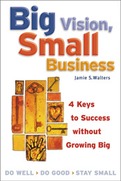Big Vision, Small Business
4 Keys to Success without Growing Big
Jamie Walters (Author)
Publication date: 09/25/2002
While most of the business world worships size and constant growth, Big Vision, Small Business celebrates the art—and power—of small. Based on interviews with more than seventy small-business owners and on her own experiences as a successful small-business entrepreneur, Jamie Walters shows how a business can stay small and remain vital, healthy, and rewarding.
If you long to run a successful, socially conscious enterprise as one element of a fulfilling personal life, Big Vision, Small Business shows you how. Covering growth options and small-enterprise advantages, inspired visioning, communication, and right-relationship, mindset issues and expectation management, and wisdom and mastery practices, Big Vision, Small Business is a must-read for every entrepreneur and futurist.
If you long to run a successful, socially conscious enterprise as one element of a fulfilling personal life, Big Vision, Small Business shows you how. Covering growth options and small-enterprise advantages, inspired visioning, communication, and right-relationship, mindset issues and expectation management, and wisdom and mastery practices, Big Vision, Small Business is a must-read for every entrepreneur and futurist.
Formats
Paperback - $17.95 - Members: $16.16
Paperback - $17.95 - Members: $16.16
ePub - $17.95 - Members: $12.57
PDF eBook - $17.95 - Members: $12.57
Find out more about our Bulk Buyer Program
- 10-49: 20% discount
- 50-99: 35% discount
- 100-999: 38% discount
- 1000-1999: 40% discount
- 2000+ Contact ( bookorders@bkpub.com )
Orders of 10+ copies shipping to one address receive free ground shipping
within the U.S. Shipping to separate individual addresses via USPS media mail will be applied a handling fee:
Book Details
Overview
While most of the business world worships size and constant growth, Big Vision, Small Business celebrates the art—and power—of small. Based on interviews with more than seventy small-business owners and on her own experiences as a successful small-business entrepreneur, Jamie Walters shows how a business can stay small and remain vital, healthy, and rewarding.
If you long to run a successful, socially conscious enterprise as one element of a fulfilling personal life, Big Vision, Small Business shows you how. Covering growth options and small-enterprise advantages, inspired visioning, communication, and right-relationship, mindset issues and expectation management, and wisdom and mastery practices, Big Vision, Small Business is a must-read for every entrepreneur and futurist.
If you long to run a successful, socially conscious enterprise as one element of a fulfilling personal life, Big Vision, Small Business shows you how. Covering growth options and small-enterprise advantages, inspired visioning, communication, and right-relationship, mindset issues and expectation management, and wisdom and mastery practices, Big Vision, Small Business is a must-read for every entrepreneur and futurist.
About the Author
Table of Contents
Excerpt










